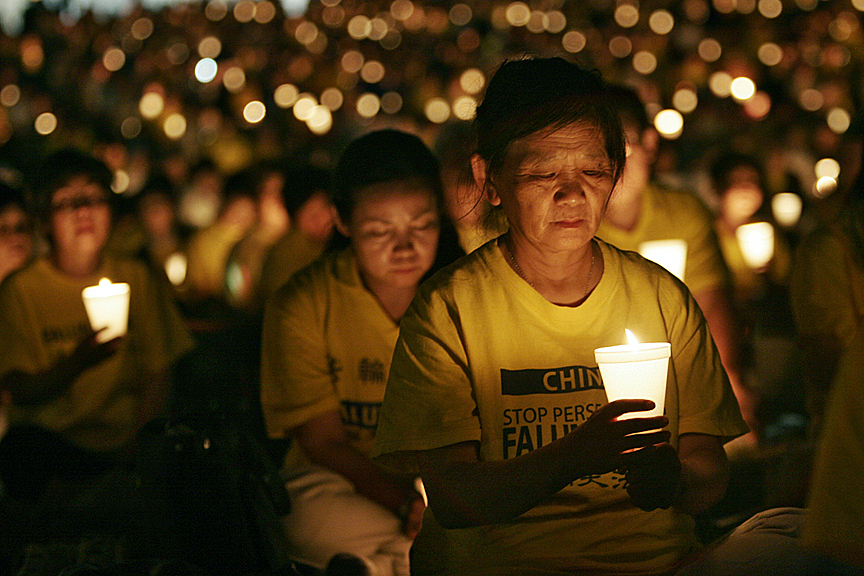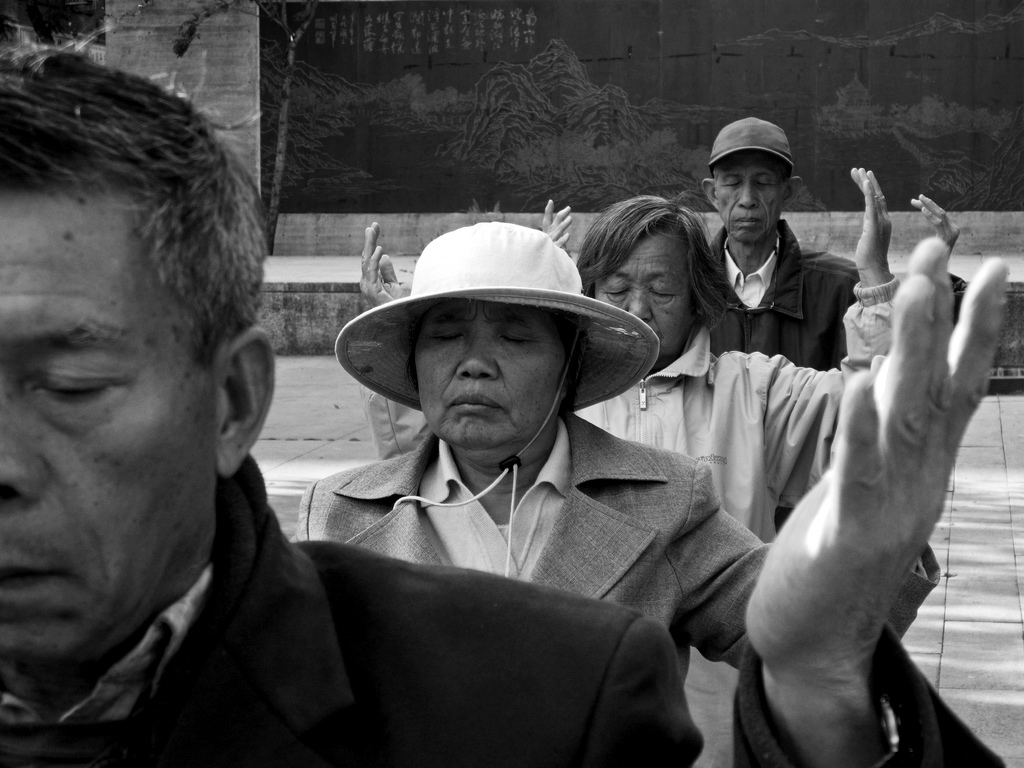When the People’s Bank of China announced that it would switch its 1 yuan notes for coins back in January, it did so not only to increase durability and recyclability of the money, but allegedly also to counter the spread of subversive comments criticising the government written on the low-value notes. The move is believed to target Falun Gong, a spiritual group that has been persecuted for almost two decades now and whose members are said to be behind the reactionary messages. It is one of many attempts in a seventeen-year campaign of the Communist Party at curbing the movement’s influence and wiping them out.
Falun Gong, often also referred to as Falun Dafa, is a spiritual practice based on qigong, which sets it apart from other persecuted groups like the Tibetans and the Uyghurs, who are defined by their ethnic belonging and political aspirations. It first emerged in 1992, during the so-called “qigong fever” of the 1980s and 1990s, when public practices of qigong became a mass phenomenon in China.

Qigong combines conscious breathing, posturing of the body and movements with meditation, and has its roots in traditional Chinese culture, spanning back thousands of years. It is praised by its practitioners for its recreational and spiritual value, but is also used in medicine and martial arts. Attempts at formalising and grouping the various qigong schools were first made under Mao Zedong at the end of the 1940s. After Mao’s death in 1976, the practice became ever more popular, and an estimated 60 to 200 million Chinese were avid followers of qigong at its peak.
The Chinese government, wary of movements that might undermine the Communist Party’s rule, set up a regulatory body in 1985. However, Falun Gong proved elusive from the start: since it does not require formal membership and membership fees are non-existent, the practice was harder to control than other schools of qigong. Apart from that, its sheer size – it had an estimated 70 million practitioners by the end of the 1990s – meant that the movement could prove to be a challenge to the Chinese government itself.
Chinese governmental pressure increased, which was answered in turn with resistance from the Falun Gong community. Since Falun Gong is more spirituality-oriented than other schools of qigong and its followers are thus more invested in it, attempts to curb the influence of Falun Gong were met with staunch resistance. In April 1999, ten thousand of the estimated 70 million practitioners of Falun Gong demonstrated peacefully in Beijing, demanding an end to persecution. Two months later, the Party initiated a large-scale crackdown on Falun Gong and other qigong schools, imprisoning thousands of Falun Gong members and closing qigong clinics and research institutions.
While some of the schools were allowed to continue their practice under increased government oversight, Falun Gong and the related school of Zhong Gong were banned. Hundreds of thousands of Falun Gong members were sent to labour camps, while others were detained in prisons, psychiatric clinics, or extrajudicial black sites, often living under grave conditions and usually having been sentenced without due judicial proceedings. The goal is re-education: Falun Gong inmates are to renounce their beliefs and to promise that they would never contact the movement again. By 2009, more than 2,000 deaths resulting from physical abuse and torture had been recorded. While the labour camps were officially abolished in 2013, they continue to exist under a different guise.
In 2006, allegations were made that the Chinese government was harvesting organs from Falun Gong prisoners, often said to be good donors due to their healthy lifestyle. The Kilgour-Matas report, written by former Canadian Secretary of State David Kilgour and human rights lawyer David Matas, came to the conclusion that there was no source for more than 40,000 organs that were transplanted between 2000 and 2005 in China. Also, the waiting time for a new organ was deemed suspiciously low – about two weeks as compared to 32.5 months in Canada, indicating that organs were procured on demand. The publication of the report caused widespread alarm among the international community. While China denied the allegations, it also could not provide a satisfactory answer to the claims.

In response to the crackdown, the Falun Gong movement went underground, continuing to maintain its presence through the distribution of Falun Gong materials among the Chinese population. Those who fled abroad founded a healthy exile movement that soon became enmeshed with other opposition groups of the Chinese diaspora, challenging Chinese state media through own newspapers, TV and radio stations, and providing tools to those whose who stayed behind in order to circumvent government censorship. Further, foreign members of Falun Gong, now mainly living in the USA and Taiwan, initiated a veritable flood of lawsuits against Communist Party officials, and the movement is today reported to have filed the highest percentage of all human rights lawsuits in the 21st century. The Chinese government has responded by tapping the diaspora’s communication channels and employing diplomatic pressure to disrupt Falun Gong members’ activities.
All attempts to curb the influence of Falun Gong over the last seventeen years seem to have failed at eradicating the movement. Their numbers are still believed to be in the tens of millions, although gauging the amount of members has proved difficult. The consistent failure of anti-Falun Gong policies thus begs the question why the Communist Party continues its campaign of persecution. The explanation is simple: the Communist Party has made the case of Falun Gong a vital matter to the nation, and it is so deeply invested in the movement’s persecution that admitting a failure of its policies would deal a severe blow to the government. The price both in terms of resources and political prestige would have been lower if it had it backed down earlier, but that moment is long gone.
Photo credits:
Picture 1: Tom Waterhouse, licensed under CC BY-NC 2.0
Picture 2: ep_jhu, licensed under CC BY-NC 2.0
Picture 3: longtrekhome, licensed under CC BY 2.0










